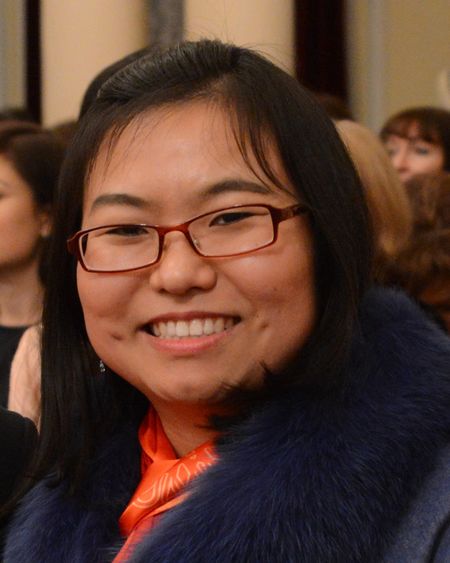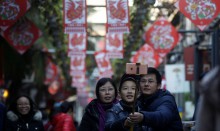The People’s Republic of China was among the first nations to recognize the independence of Ukraine 25 years ago. In January 1992, the two nations’ ambassadors exchanged credentials, thus officially establishing diplomatic relations between China and Ukraine.
To commemorate this historic event as well as to celebrate the “Merry Spring Festival” (the Chinese New Year, which falls on January 28 this year), the National Philharmonic Society of Ukraine hosted a symphonic concert, sponsored by the Embassy of China in Ukraine and assisted by the Ministry of Culture of China. True music lovers, who managed to leave festive banquets and braved January frosts, were thus able to listen to the world-famous Chinese violinist Zhu Dan, who together with the National Symphony Orchestra of Ukraine performed works by Chinese, Ukrainian, and Russian composers. During the first part of the concert, the conductor’s stand was occupied by the guru of Chinese musicians maestro En Shao, while for the second, the conductor’s baton was taken over by his Ukrainian colleague Vitalii Protasov.
The concert, which truly was a milestone in the cultural cooperation between Ukraine and the People’s Republic of China, opened up a big program celebrating the 25th anniversary of the establishment of diplomatic relations between our countries. Cultural Attache of the Embassy of China in Ukraine Zhang Yanbo shared with The Day’s readers her thoughts on the future links between China and Ukraine in the fields of culture, arts, and tourism.

Ms. Attache, Ministers of Culture of Ukraine and China Yevhen Nyshchuk and Luo Shugang held a meeting past September where they discussed issues related to cooperation between our countries in the fields of culture and arts, tourism and sports. What specific steps have already been taken in this direction, and what interesting, educational activities are planned in Ukraine and China for 2017?
“Ukraine is an important participant of the Great Silk Road. Over the past quarter century, international relations between our two nations have evolved in various fields, including economy, education, science, culture, and tourism. Every year, the Ministry of Culture of China invites a large number of art groups, performers, and artists from Ukraine for training, creative exchanges, performances, and tours. In particular, the Silk Road International League of Theaters has been created to support such activities. The league includes five best Ukrainian theaters as well, among them the Shevchenko National Opera and the National Philharmonic Society of Ukraine. Accordingly, China also sends to Ukraine art groups and managers of prominent theaters for study visits, allowing them to research the rich cultural heritage of your country.”
The recent symphony concert at the National Philharmonic Society of Ukraine, which involved world-renowned Chinese musicians, marked not only the 25th anniversary of establishment of diplomatic relations between China and Ukraine, but also the “Merry Spring Festival,” otherwise known as the Chinese New Year. Why did you combine these two events, which I believe to be quite different in nature?
“The Merry Spring Festival is our trademark cultural event. Since 2010, it has been held in many major cities around the world. Its goal is to popularize the Chinese culture and build a harmonious world. This festival is a symbol of the concept of joy, shared enjoyment of the beauty, and it contributes to the formation of positive emotions.
“In the past year, the Merry Spring Festival was already held in Ukraine, namely in Kyiv and Lviv. This year, it is endowed with a special meaning, since it coincides with the 25th anniversary of the establishment of diplomatic relations between our countries.”
Let us discuss the Chinese film industry. After all, the interest in it has grown markedly not only at home, but also abroad over the past decade. This has included Ukraine. Ang Lee’s movies Crouching Tiger, Hidden Dragon, Brokeback Mountain, and Life of Pi as well as John Woo’s Broken Arrow and Mission: Impossible 2 and works of many other filmmakers have been enormously popular with cinema audiences and industry professionals alike. Who are the most popular film directors in today’s China? Which themes and subjects concern the Chinese audience?
“Indeed, modern Chinese cinema has been developing very strongly. Like elsewhere in the world, people take great interest in the work of the director Ang Lee who won many prestigious international film awards, including the Golden Bear of Berlinale, the Golden Lion of the Venice Film Festival, the Golden Globe, and the Oscar. Zhang Yimou is very popular in our country as well, having directed Red Sorghum, Hero, and House of Flying Daggers. Incidentally, he was also the director of the opening and closing ceremonies of the Beijing Olympic Games in 2008. You have surely heard of the comedy actor, writer and producer Zhou Xingchi [better known as Stephen Chow. – Author], who was involved in some capacity with films including Kung Fu Hustle, CJ7, and The Mermaid. You have probably seen films of the director, screenwriter, actor Chen Kaige, like Farewell My Concubine, Killing Me Softly, and To Each His Own Cinema.
“The themes and subjects of interest to the Chinese audience today are certain historical periods of our nation’s past and philosophical films which explore the essence of the universe, look for people’s life paths, and deal with stories of the ‘little men,’ which are applicable to all of us. Of course, it is also love, that eternal theme of art, which does not leave indifferent the Chinese audience as well.”
And what about the Ukrainian film classics and contemporary movies, does the Chinese audience know them and our actors?
“In China, people know the works of Yurii and Mykhailo Ilienko and are familiar with movies directed by Oles Sanin and Maryna Vroda. There is a lot of interest in the Ukrainian cinema in China (as well as in the Chinese cinema in Ukraine), so we plan to hold Days of National Cinema in our countries in the future.”
As you know, one of the four great Chinese inventions that changed the destiny of humanity is printing (the other three are paper, compass, and gunpowder). Today, with e-books becoming more popular around the world, how many of their “paper doubles” are published in your country? What books, and of which authors and genres, became bestsellers in the past year? Do they get translated into Ukrainian?
“There are no unquestioned leaders in the field of publishing, since people’s tastes and preferences differ greatly. Still, the most currently popular books are works of Gao Ming, including Genius on the Left, Lunatic on the Right, which is a very powerful, emotional, and humane prose study of how the mentally ill people perceive the world around them, and A History of the Ming Dynasty. Meanwhile, Lee Cixi is acknowledged as the most widely read author. Unfortunately, none of these books has been translated into Ukrainian yet.”
China is one of the most ancient, mysterious, and exotic civilizations on the planet Earth, and the tourist interest in your country is growing by the year. What sights would you suggest to Ukrainians who come to China for the first time?
“China is a large country with a rich history. There are many places that are worth visiting. If someone, for example, was fascinated by culture and heritage, I suggest they go to Beijing, Xian, Luoyang, and Nanjing. These cities served as capitals of ancient imperial dynasties. We have unusually beautiful nature there, including mountains and scenic lakes. If someone’s interests center on religion instead, they should go to the city of Xinhai, Henan. There one will see ancient temples and well-preserved monuments of religious architecture. For lovers of fast-paced modern life, ethnic cuisine, and entertainment, my advice is not to miss Shanghai, Guangzhou, Dalian, Hainan, Xiamen. The sea and various attractions in these areas will not leave you indifferent.”
On January 28, 2017, the Chinese New Year will come, it being the Year of the Fire Rooster. Are the traditions, which since ancient times were respected in the Middle Kingdom, still going strong in modern China? Or have they turned into a mere decorative element of the noisy and funny New Year?
“I have already said that the Spring Festival, which is our name for the Chinese New Year, is the most solemn festival in our country. In contemporary China, the traditions of its celebration are well-preserved, respected, and observed. It is a family holiday, the day of best wishes, when people decorate their houses, paste couplet inscriptions on doors and windows which wish happiness, luck, health, and love in the new year, perfect order reigns in people’s apartments, all relatives gather and sit down to New Year’s meals, and children get red money envelopes. Also on this day, we honor the memory of our deceased loved ones.
“The custom calls for jiaozi dumplings and nian gao sliced glutinous rice cake to be offered on this day. The word jiaozi sounds similar to the words ‘seeing off the old and meeting the new,’ while nian gao means ‘improving life by the year.’ Also, dumplings’ shape resembles ingots of gold and silver, thus signifying a wish for wealth.
“Now more and more people celebrate the Spring Festival in a restaurant, and many ethnic minorities have their own traditional dishes. Still, the festive meal should always include fish, dumplings, and minko. Swear words are totally disallowed on these days, and only nice and positive ones should be uttered, for they shall then accompany the speaker for a year. Also, no one should cry during New Year’s night.”







